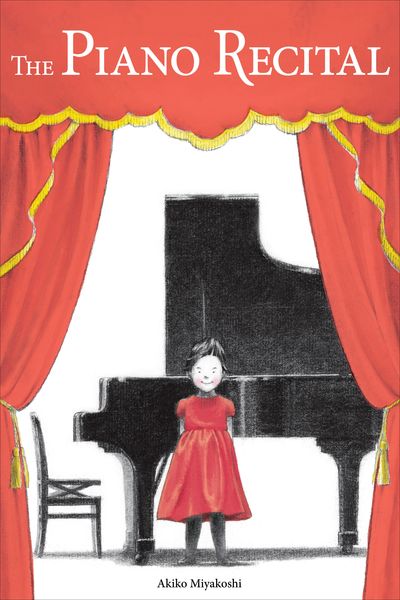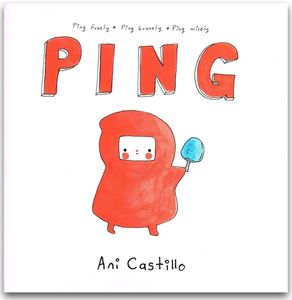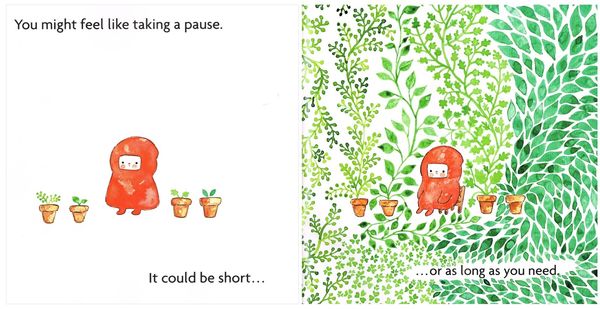Book Therapy: The Wisdom of Children(’s Books)
By Stacey May Fowles
“I’ll be okay…I’ll be okay…”
—Akiko Miyakoshi, The Piano Recital
It’s probably not surprising that, after eighteen months of extended maternity leave, I’ve found the return to full time writing a little difficult. It’s been about four months now and I still have moments when I feel like I’m floundering, unsure of how I fit into a working world that went on without me. It seems cruel that I spent time on leave longing for small, sacred windows of writing time, and now that they’re available I’m struggling. So much time has passed, so much has changed, and it can be hard to decipher what I truly care about (as opposed to what I used to care about,) and what I really want to get down on the page.
Like most writers I know, I put a great deal of pressure on myself to produce, and don’t have a great deal of compassion for myself when I don’t. Logically I know that, as with any great shift, it will take some time to find my footing and get into a groove again. Of course I know that the best way to move forward is simply by doing. But it’s so easy to feel lost and defeated, or like I’m starting all over again. And no matter how many of my fellow writers assure me that this struggle is perfectly natural, I seem to have a special skill for beating myself up about not being exactly where I want to be.
I’ve found solace for these complicated feelings in an unlikely place. Every night, around 6:30 PM, I sit down with my two year old and read her stories. Reading to children is very obviously a good thing to do for a wide variety of reasons, but the ritual actually began as part of an elaborate, complex, carefully enacted bedtime routine performed in aid of her going to bed at a “reasonable” hour. Under the instruction of a very necessary sleep consultant, I began reading my daughter the exact same story every single night of the week, an action designed to signal to her developing brain that it was time for slumber. (I can now recite that twenty-two page book from memory and probably will be able to for the rest of my life.) Now bedtime involves no less than five—and often well over a dozen—books before she’s willing to let me turn out the light.
I admit I had no prior experience with children’s books before this ritual began. Now I’ve read hundreds and hundreds, and have fallen madly in love with so many of them. My daughter’s reading list ranges from well-loved classics to new and trendy, from the irreverent light-hearted to the deeply meaningful, from totally non-sensical to a little too on-the-nose. (I’ve also admit I’ve read a lot of very, very bad children’s books.)
There’s Sesame Street books and Mickey Mouse books. Books about donkeys and books about space. My current favourite is a book about a diner run by monsters (“Mommy favourite,”) and she really loves the one about a yak who befriends a dove. There are books we’ve had to strategically hide because they’ve been read so many times we’re teetering on madness, and then there’s books that she gets sick of long before we do.
Even though the reading is for her, I often find there’s a book in the pile that meets me exactly where I’m at. It’s easy (and lazy) to think of children’s books as silly or simplistic, to think that they don’t have much to offer adults, but the clarity of their messages, the paring down and polishing of their fundamental ideas, mean they have the potential to be a lightning bolt, to reveal to us just what we need exactly when we need it.
If we’re lucky, they can actually help us see more clearly, and in ways we might have otherwise overlooked.
A friend of mine who is an expert on children’s books once told me that the best ones don’t clearly spell out their valuable lesson. They aren’t didactic or heavy-handed, but rather there’s a magical subtlety and fundamental grace to them. Their authors and illustrators trust the wisdom of children to decipher the truths that lie inside.
Since she imparted that nugget about what makes a really great children’s book, I can see this tactic employed by the very best in my daughter’s growing library. A book about a grumpy monkey that teaches children it’s okay to have bad days. A book about a cranky bear that teaches children it’s okay to be plain. A book about a dancing giraffe that teaches children it’s okay to march to your own beat. These may all seem like very basic, “juvenile” lessons, but they are the ones we’re likely to forget in the frantic buzz of our daily lives. In fact it amazes me how many times I’ve sat down, with my daughter on my lap and her latest library book in my hand, and had to pause on a page that hit me harder than I expected to.
Your CanLit News
Subscribe to Open Book’s newsletter to get local book events, literary content, writing tips, and more in your inbox
For example, Ani Castillo’s recently released Ping, with its vibrant colours and sparse yet poignant illustrations, beautifully told me that you can control what you put into the world but can’t can’t dictate what comes back. The book also quietly assured me it’s okay if you feel like taking a pause; “It could be short…or as long as you need.” Akiko Miyakoshi’s The Piano Recital reminded me of the universal (and yet isolating) anxiety of individual creativity. It depicts how Momo, a young girl about to take the stage, is suddenly entertained and delighted by a troop of performing mice. Ultimately in supporting another, “Momo’s own racing heart and worries are long forgotten."
Even Winnie-the-Pooh’s good friend Piglet struck a chord with me recently, addressing my often debilitating creative impatience by wisely observing “sometimes waiting for things can be better than the thing you are waiting for.” (Piglet, like most of us, was waiting for spring.)
There’s also something to be said about the nurturing quiet in which these messages are delivered. After a busy day at a desk, when I’m finally spending quiet time with the person I love more than anyone in the world, I find I’m much more receptive to the messages that children’s books impart. I’m much am more apt to believe that I should communicate passionately, mindfully, wisely, joyfully, and hopefully, as Castillo suggests, or that “I’ll be okay,” like Miyakoshi’s main character repeats to herself before she’s about to perform.
Of course not all children’s books need to be deep and meaningful. They don’t all have to be be life-changing, moving, instructive, or award-winning. They certainly don’t have to serve some greater purpose or give us some great “a-ha” moment. Sometimes children need bizarre, ridiculous, hilarious, light-hearted vacations from the messy business of growing up, just like adults do. They need books about the surprising uses of dinosaurs (footstools! kites! can openers! snow plows!) or tigers that come over for tea and eat everything in the house (rude.) Sometimes all children really need is the opportunity to sit down and read with you, no matter what the book of the moment and its message happens to be.
During my introductory crash course in children’s books, I’ve learned a great deal about their capacity to serve a wide array of purposes, and I’m grateful that during a time of personal transition, I’ve found so much comfort in their “childish” lessons. I think it’s important for adults to not dismiss or discount the wisdom imparted in their pages—even if that wisdom is just seeing the value in a quiet open-hearted moment in a dimly lit room at the end of the day.
The views expressed by Open Book columnists are those held by the authors and do not necessarily reflect the views of Open Book.
Stacey May Fowles is an award-winning journalist, novelist, and essayist whose bylines include The Globe and Mail, The National Post, BuzzFeed, Elle, Toronto Life, The Walrus, Vice, Hazlitt, Quill and Quire, and others. She is the author of the bestselling non-fiction collection Baseball Life Advice (McClelland and Stewart), and the co-editor of the recent anthology Whatever Gets You Through (Greystone).






